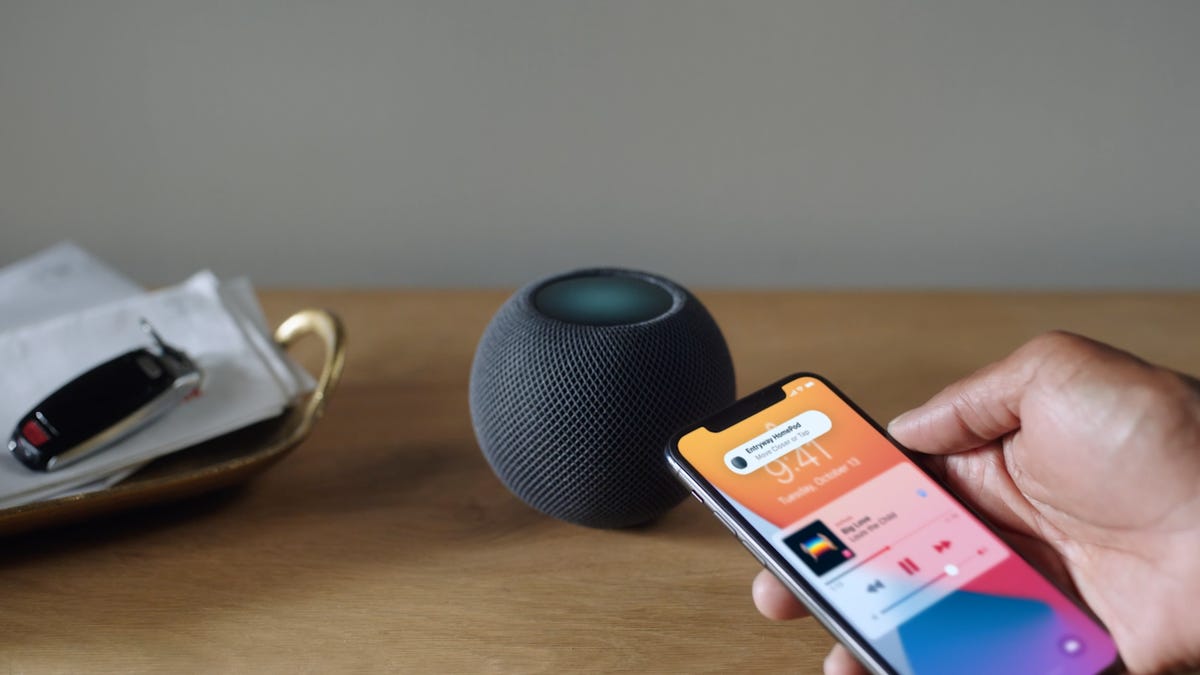 Why You Can Trust CNET
Why You Can Trust CNET HomePod Mini is here, and Apple's new smart speaker is $99
The new model hits a lower price, putting the new HomePod in the same range as smaller smart speakers from Google and Amazon.

Apple unveiled a new HomePod Mini smart speaker at its October iPhone event on Tuesday, giving it a brand new piece of hardware to pit against Amazon, Google and others in the race to bring voice control into our homes. Powered by Apple's Siri voice assistant, the HomePod Mini is smaller than the original 2018 model, and it comes with a lower price tag of $99 (£99, AU$149).
With Google having already launched its own new smart speaker this holiday season, and Amazon's new Echo line-up on the way soon, Apple's new speaker aims to convince consumers to consider an alternative to the Google Assistant- and Amazon Alexa-based alternatives that currently dominate the segment. The sphere-like device, which was launched alongside the new iPhone 12, features a familiar mesh covering, along with a touch surface with controls on its flat top for volume, play and pause.
Apple says it has combined a powerful voice assistant with the same excellent sound quality in the original HomePod. Additionally, the device's privacy features will mirror the way Apple configures the original HomePod. It won't tie your requests and conversations with Siri to your Apple ID, providing a form of anonymization, and the data will be encrypted, Apple says.
"There's a lot of Apple innovation packed into such a small speaker, all at an affordable price," Bob Borchers, Apple's vice president of worldwide product marketing, said in the announcement. The product was unveiled at an Apple event filmed at the company's Silicon Valley headquarters and held virtually on Tuesday.
The device will be available for order on Nov. 6, according to Apple, and it will start shipping the week of Nov. 16. The lower price sets it apart from the original HomePod, which is priced at $299 in the US (though it can often be found discounted to $199). Amazon and Google have smart speakers in that lofty price range as well, but most of their market share comes from speakers in the $50 price range. That high price is one of the factors that has limited sales for the HomePod, making it harder for Apple to gain a foothold for Siri as a household voice assistant.
Apple says the HomePod Mini has an "acoustic waveguide to direct the flow of sound down and out toward the bottom of the speaker for an immersive 360-degree audio experience."
To justify the higher price of the original HomePod, Apple pitched it as a high-end shelf speaker. The first HomePod largely delivered on that promise, but that positioning also helped shield Siri from too much scrutiny as a conversational voice assistant next to the superior Alexa and Google Assistant.
The lower price and smaller size aren't the only changes revealed in the HomePod Mini. The speaker will also work with outside music streaming services, including Pandora and Amazon, in the coming months. This integration sets the HomePod Mini apart from the original HomePod, which was limited to Apple Music for voice-controlled streaming.
The new HomePod Mini comes in space gray and white.
Still, the HomePod Mini clearly aims to work with Apple products and services, and connects the speaker to the apps running on iPhones. The goal is to let users ask Siri simple questions on the speaker that pull answers from iPhone apps, said Yael Garten, Apple's director of science and engineering for Siri.
"What really sets HomePod Mini apart is its deep integration with iPhone," Garten said.
The device also aims to let users control the smart home with their voices. This builds off Apple HomeKit, the company's platform for smart home devices that can now connect with HomePod Mini.
Apple also included HomePod Mini features geared toward tempting people to buy more than one device. Multiple speakers can sync music in different parts of a home, and when two speakers are together, they go into stereo mode. The company said this will complement the high quality sound delivered by its "computational audio" system, which analyzes music and adjusts tuning and other audio features to optimize the sound.
Finally, the device is positioned as a family-friendly addition to the home. The Intercom feature, which resembles Google's Broadcast feature, lets users ask Siri on their phones to play a message on the smart speaker for people in other rooms to hear. The recipient can send a message back by voice, too. The HomePod Mini can also tell the difference between different household members' voices and personalize responses back to them.



